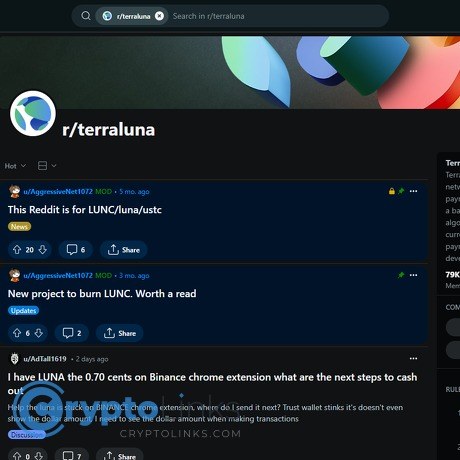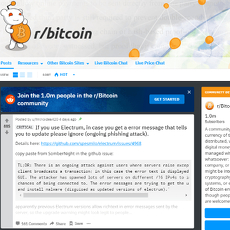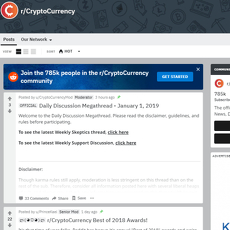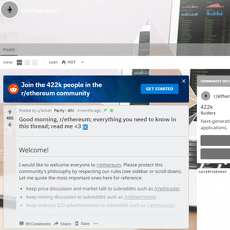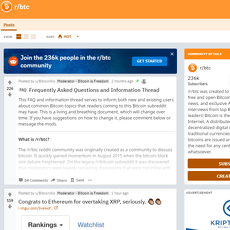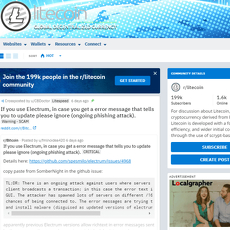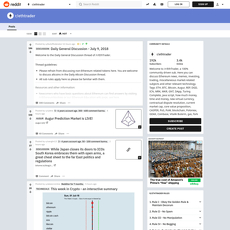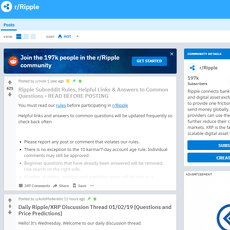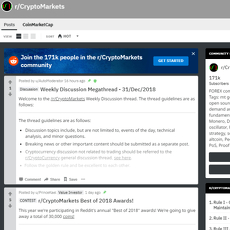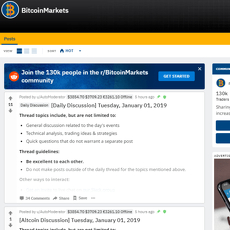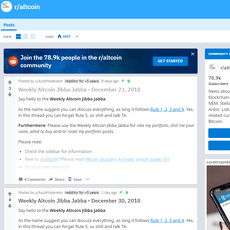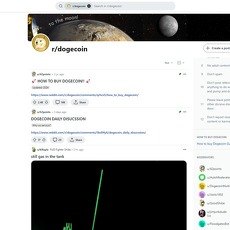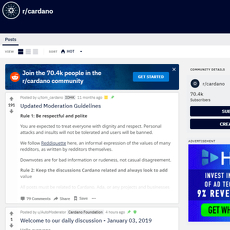r/terraluna Review
r/terraluna
www.reddit.com
r/terraluna Review Guide: Everything You Need to Know + FAQ
Ever scroll through r/terraluna and wonder what’s legit and what’s just noise? Or whether that “urgent” wallet tip is actually helpful—or a trap? If that sounds familiar, you’re in the right place.
Describe problems or pain
Let’s be honest: the Terra Luna subreddit can be a maze. You’ll see helpful threads right next to confusing or heated ones, and it’s easy to get lost. The most common headaches I see:
- LUNA vs LUNC mix-ups: People use “Terra” loosely and bounce between Terra 2.0 (LUNA) and Terra Classic (LUNC). One wrong network in Terra Station and your funds go to the wrong place.
- Hyped posts and price bait: “100x soon” claims, cherry-picked charts, recycled drama from the 2022 collapse—easy to click, hard to trust.
- Mixed-quality advice: Screenshots as “proof,” old tutorials resurfacing after updates, and comments that sound confident but lack sources.
- Signal vs noise problem: During volatile moves, the sub gets flooded. Accurate updates sit under a pile of memes, duplicates, and speculation.
And there’s a bigger layer: online social bias. Research in Science shows that early upvotes can tilt perception and push posts higher than they deserve, while a well-known MIT study found false news spreads faster than truth on social platforms. In other words, a slick headline can outrun a careful explanation. That matters when you’re making decisions about wallets, governance votes, or even a simple send.
Promise solution
I’m going to map the subreddit for you like a local guide. You’ll learn:
- Which threads actually help you make better decisions
- How to avoid risky advice and spot coordinated shilling
- Where to find verified info on Terra, Terra Station, and wallet safety
- Simple filters and search tricks to get answers faster—without endless scrolling
The goal: spend less time guessing and more time using r/terraluna as a reliable tool for news, learning, and smart discussion.
Who this guide is for
- Newcomers who want Terra basics without stepping on landmines
- Holders who want timely, reliable updates without hype
- Curious readers deciding whether to follow or engage with the community
What I’ll cover
- How the subreddit works today and what the community is really like
- Rules, moderation style, and how to avoid getting your post removed
- Smart ways to search, filter, and find the right threads
- How to read investment talk with a healthy skepticism
- Quick how-tos you’ll see often: Terra Station steps, staking, safety
- The best off-Reddit resources to confirm what you read
- A straight-talking FAQ based on the top questions people ask
Real example you’ll recognize: A post says, “LUNC burn update—massive supply drop soon.” Before you act, you’ll learn to check the governance link, verify the burn address on an explorer, and scan comment timestamps for coordination. No source? No action.
Quick disclaimer
This is not financial advice. I’m reviewing the subreddit experience and pointing you to resources so you can make your own decisions safely. Always verify links, keep your seed phrases offline, and never invest more than you can afford to lose.
Ready to cut through the noise? Next, I’ll show you what r/terraluna looks like today—size, posting rhythm, how the community talks about itself post-2022, and where LUNA vs LUNC actually splits. Curious which flairs and threads are worth your time right now?
What r/terraluna is today: snapshot, history, and community vibe
Subreddit basics
r/terraluna sits in a strange but useful middle ground: big enough to surface news quickly, small enough that threads don’t disappear instantly. Activity spikes around upgrades, governance votes, or exchange listings, then settles into a cadence of daily news, wallet questions, and market chatter.
You’ll usually find:
- Pinned posts at the top for ongoing topics—think upgrade coordination, governance summaries, or important alerts (wallet safety, phishing campaigns, etc.).
- Weekly or rolling discussion threads to collect common questions and keep one-off posts from cluttering the feed.
- Post flairs such as News, Discussion, Help, or Dev to set expectations for what’s inside.
Post-2022, the community tone is practical and a bit battle-scarred. People still reference the collapse, but most regulars want signal: what’s shipping, what’s being fixed, and how to avoid getting burned again. As one user put it in a top-voted thread:
“Trust the chain, not the chat—verify everything.”
That resonates. Social can inform you fast, but it can mislead you just as fast. Pew Research notes a large share of people get news from social platforms; that’s convenient, but it raises the need to double-check sources before acting.
LUNA vs LUNC (Terra 2.0 vs Terra Classic)
This is the single biggest source of confusion for newcomers. LUNA is the token for Terra 2.0. LUNC is Terra Classic. Different chains, different token economics, different roadmaps—often discussed in the same place.
How the subreddit handles it:
- Flairs and titles often specify [LUNA] or [LUNC]. Many posters do this well; some still forget, so always scan the body text for chain hints (explorer links, validator names, chain IDs).
- Pinned clarifications appear during major events to separate Classic vs 2.0 discussions.
Quick ways to reduce mix-ups right from the feed:
- Look for [LUNA] or [LUNC] in titles and flairs before you click.
- Use the subreddit’s search bar with simple tokens like LUNC or LUNA to filter your view in a pinch.
- Check links: Terra Classic explorers and Terra 2.0 explorers are not interchangeable. If the URL doesn’t match the chain you expect, stop.
I know this sounds basic, but it prevents the classic “wrong chain, wrong wallet” mistake that keeps showing up in Help posts.
Moderation, rules, and enforcement
The rules are straightforward and focused on safety and quality:
- No scams or spam: obvious shills, phishing links, or “guaranteed returns” go fast.
- Cite sources for news or claims, especially during volatile events.
- Use flairs and post in active megathreads when requested.
- No personal info and no doxxing. Screenshots are fine—redact addresses and IDs.
AutoModerator handles the first filter: it removes common spam patterns, quarantines posts with suspicious links, and nabs low-effort titles. Human mods tend to be responsive during high-traffic moments (upgrades, exchange news) and will remove posts that spread misinformation or recycle low-quality rumors. If your post disappears, it’s usually one of three reasons: wrong thread, missing sources, or scam-adjacent language (even unintentionally).
Want a sense of how this works platform-wide? Reddit’s AutoModerator guide shows the kinds of filters many subs rely on. Expect similar guardrails here.
Content types you’ll see
The feed isn’t monotone—it’s a mix that reflects the project’s “rebuild and verify” phase:
- News: releases, validator updates, exchange notices, security alerts.
- Governance: proposal announcements, voting reminders, post-mortems on passed/failed votes.
- Wallet/how-to threads: Terra Station questions, staking and delegation issues, hardware wallet connections.
- Dev updates: SDK changes, testnet notes, bug fixes, integrations.
- Market sentiment: price talk, funding chatter, macro tie-ins—quality varies widely.
- Memes and morale boosts: less frequent than pre-2022, but still pop up, especially after positive releases.
Sorting helps you control the noise:
- Top for consensus picks over a time window (good for “what mattered this week”).
- New for breaking updates and alerts (higher risk of unverified claims).
- Controversial to spot debates and conflicting interpretations—useful when you want to see both sides fast.
What the community does well (and not so well)
Strengths
- Real-time alerts: outages, fake airdrops, or phishing waves get flagged quickly. I’ve seen links to newly spun-up scam domains posted within minutes, often with steps to stay safe.
- Tutorials and fixes: from Terra Station hiccups to validator changes, you’ll find step-by-step help with screenshots and clear caveats.
- Governance awareness: proposals are surfaced early, with summaries and pros/cons so you can read the on-chain text with context.
Weak spots
- Speculation spirals: especially when price moves. Research in finance consistently shows social platforms can amplify herding behavior—great for speed, risky for judgment. See, for example, peer-reviewed work on herding in crypto markets.
- Recycled takes: the 2022 collapse still fuels repeated debates that rarely add new information. It’s understandable—but it can bury practical threads.
- Brigading during big moves: outside communities sometimes flood threads, boosting extreme bullish or bearish claims without data. Sorting by Top (24h) and cross-checking timestamps helps counter that.
One more emotional truth: lots of people here were hurt in 2022. You’ll feel that in the comments. That doesn’t make the sub less useful—it makes the best contributions sharper and more protective. But it also means you’ll see strong opinions. Keep your head clear and your wallet safer than your pride.
Want to cut straight to the good stuff? Next up, I’ll show you the exact filters, flairs, and search operators I use to turn r/terraluna into a fast, trustworthy feed. How many seconds can you save per question if every click is the right one?
How to use r/terraluna like a pro (and save time)
Search smarter with flairs and operators
If you’ve ever spent 20 minutes scrolling only to find nothing useful, this is where that stops. On r/terraluna, speed is about targeting, not luck.
- Start with flairs: tap the “Post flair” filter under the subreddit header and pick News, Discussion, Help, or Dev to instantly cut noise. When you’re troubleshooting, Help and Dev flairs are your best friends.
- Use Reddit search operators: in the search bar, toggle “Search within r/terraluna,” then use:
- title: narrow by headline. Example: title:"Terra Station" memo
- author: see posts from a specific user. Example: author:terra-money
- site: find posts linking a domain. Example: site:agora.terra.money or site:medium.com
- self:yes for text posts only; self:no for link posts
- subreddit:terraluna if you’re searching from the Reddit homepage
- Sample “fast-answer” queries:
- subreddit:terraluna title:proposal station — governance talk with Terra Station context
- subreddit:terraluna self:yes "Ledger" "Terra Station" — text-based Ledger fix threads
- subreddit:terraluna site:github.com "terra" — posts that link to relevant code changes
- Use Google for deep cuts: site:reddit.com/r/terraluna "IBC" "memo" often surfaces older gems Reddit’s native search misses.
“Trust, but verify. In crypto, screenshots are receipts; links are proof.”
Pro move: once you find a great query, bookmark the results page so you can refresh the same filter next time news breaks.
Find the right megathreads and stickies
Most ongoing topics live in stickied posts. They’re at the top of the sub with a pin icon. If you skip these, you’ll miss the most focused answers and your post might get removed by AutoMod.
- Common stickies to watch: weekly Help Desk, live Upgrade / Governance threads, wallet support megathreads during outages or version bumps.
- When to post in a megathread:
- You’re asking about a common event (e.g., “Station not syncing,” “Ledger firmware mismatch”).
- You’re reacting to a new proposal or upgrade that already has a pinned discussion.
- When to post standalone:
- You have a unique bug with steps-to-reproduce and logs.
- You’re sharing an original tutorial, dataset, or dev update that adds fresh info.
Example: during Station updates, I’ve seen standalone “Is Station down?” posts get auto-removed while the official sticky had real-time fixes, Ledger workarounds, and links to the right download. One click saved 30 minutes of guesswork.
Posting etiquette that gets replies
Good posts get help fast. Bad posts get buried, or worse, nuked.
- Write a clear, specific title:
- [Help] Ledger not detecting LUNA on Station desktop (Windows 11, v1.4.3) — what am I missing?
- [Discussion] Proposal 1234 — pros/cons of changing min gas fees?
- Provide context up front:
- App/wallet versions, OS, chain (LUNA vs LUNC), validator name, and what you already tried.
- Transaction hash and a redacted address for verifiability. Never show full seed or private info.
- Attach proof: link a Terra explorer page, proposal page, or official release notes. If it’s not linkable, expect skepticism.
- Use images responsibly: blur addresses, remove QR codes, and cut any unique identifiers. Add a quick caption: “Screenshot after retrying with fresh session”.
- Pick the right flair: mis-flairing a support post as “News” triggers AutoMod and annoys readers.
- Avoid: price target posts, referral links, “Thoughts?” with no context, and reposting resolved issues without new info.
Small signals matter. A well-structured post with a hash and version number says “I respect your time,” and the community responds in kind.
Spotting quality info vs hype
Crypto forums are emotional by default. Your edge is calm verification.
- Cross-check claims: if someone references a governance change, look it up on Terra Station’s governance portal. For transactions or validator data, confirm on Terra Finder.
- Evaluate the messenger: check the account’s age and comment history. Brand-new accounts with extreme certainty are a red flag.
- Check timestamps: proposals evolve. Sort by “New” inside the thread to see whether the original claim has already been corrected.
- Look for sources over vibes: posts linking to GitHub commits, official repos, or signed announcements deserve priority over cropped screenshots.
- Beware of astroturfing patterns: identical praise across multiple threads, unusual emoji spam, or synchronized comments landing within minutes.
- Remember the science: a large-scale MIT study found false news spreads faster than truth on social networks (Vosoughi, Roy, Aral, 2018). In other words, hype outruns facts—unless you slow down and check.
If a post promises “guaranteed airdrops” or “insider” allocations, close the tab. If it provides a proposal number, a link to the diff, and an explorer reference, give it your attention.
Handling heated topics safely
Terra discussions can turn fiery, especially around governance and price action. You don’t have to absorb that heat.
- Set your feed on purpose: when emotions are running high, sort by Top (Today) to see what survived initial scrutiny. Use New only if you’re hunting breaking fixes and are willing to verify.
- Filter what you don’t need: use the flair filter to show only Help or Dev if price talk drains your focus.
- Use Reddit’s tools: block hostile users, report rule-breaking, and unfollow threads that spike your stress.
- Anchor to facts in arguments: ask for proposal links, transaction hashes, or official tickets. If none appear, disengage.
- Mind your own bias: if a post “feels right” because it matches your position, that’s the moment to double-check. Confirmation bias is expensive.
I stick to a simple rule when threads get tense: if I can’t summarize the claim in one sentence with a verifiable link, I don’t act on it.
Curious how this plays out when the conversation turns to “Is Terra Luna still a good investment?” and what the sub gets right (or wrong) about it? Let’s take a hard look at that next.
Investment talk on the sub: expectations, risks, and reality
“Is Terra Luna still a good investment?”
I see this question pop up on r/terraluna almost daily, and the best answers echo the same truth: it depends on your risk tolerance and time horizon. Terra is not a low-volatility, blue-chip play. It’s a speculative bet with real technology, real scars, and an uneven path forward.
“Hope is not a strategy. Position sizing is.”
Here’s what the most grounded commenters usually bring up before they even talk price:
- History matters: the 2022 collapse isn’t just a footnote—it shapes trust, liquidity, and listings today.
- Tokenomics changed: look at issuance, staking APR, slashing risks, and unlock schedules. Screenshots of green candles don’t replace a supply schedule chart.
- Volatility is the feature, not the bug: both LUNA (Terra 2.0) and LUNC (Terra Classic) can move fast on thin narratives. If you can’t handle double-digit swings, this likely isn’t for you.
- Staking yields aren’t “free money”: they’re compensation for risk. Validate whether emissions and fee flow can sustain advertised APRs.
When I assess sentiment on the sub, I ignore the “100x by Friday” threads and look for posts that link tokenomics pages (e.g., circulating supply, emissions, burns), verify official docs, and cite governance or code changes. If a take can’t point to on-chain or official sources, it’s just a vibe.
“Does Terra have a future?”
Whenever this debate flares up, smart users anchor to measurable signals, not feelings. These are the leading indicators I watch the community reference (and amplify) when they’re doing it right:
- Developer activity: real commits, tagged releases, and issue discussions on the main org repos (not fork spam). Quantity is noisy, but sustained progress on core modules and wallets is a green flag.
- Governance with skin in the game: proposals that pass with active turnout, clear implementation plans, and follow-up posts showing what shipped.
- Ecosystem traction: active addresses, transactions per day, and DeFi TVL on third-party trackers. A single noisy airdrop does not equal adoption.
- Credible roadmaps: timelines that match what lands on-chain. If a deadline slips, is there a transparent postmortem?
When the sub pounces on a major upgrade or chain parameter change within minutes and links the PR, the proposal, and an explorer diff—that’s the good side of Reddit. When it reacts to a price wick with “institutional whales are here,” that’s the side to ignore.
What the crowd gets right—and wrong
What they get right:
- Fast alerts: governance proposals, wallet updates, and validator incidents often surface on r/terraluna faster than on news sites.
- Hands-on guides: walkthroughs for Terra Station quirks, staking issues, or hardware wallet prompts can save hours.
- Scam spotlights: users are quick to flag fake airdrops and phishing sites (when the warning includes proofs and links to official notices).
Where it goes sideways:
- Price targets without data: log-scale moon charts and “it broke resistance!” posts that ignore liquidity, supply, and catalysts.
- Cherry-picked timeframes: the classic “we’re up 50% this week” with no mention of being down 90% from last cycle.
- Echo chambers: coordinated upvotes can make weak narratives look strong. A few loud accounts don’t equal consensus.
Behavioral finance has receipts on this stuff. Studies show retail investors often chase attention and news rather than fundamentals, which can lead to poor outcomes when volatility hits (Barber & Odean, “All That Glitters”). Add social proof to the mix and narratives can outrun reality fast (Shiller, Narrative Economics).
A DYOR checklist from the community playbook
When the sub is at its best, it nudges people to research with receipts. Here’s a battle-tested checklist I see referenced—and use myself:
- Read the proposal, not the meme: open the governance item on the official portal and read the full text, rationale, and implementation details. Note quorum, turnout, and who voted.
- Confirm code exists: check the relevant repo for recent commits, tagged releases, and linked issues that match the proposal. Bonus: look for audits or at least peer reviews.
- Verify on-chain: use an explorer to confirm transactions, validator sets, parameter changes, and proposal states. Screenshots can be faked; transaction hashes can’t.
- Track real usage: check independent dashboards for active addresses, fees, and TVL. If usage isn’t moving, ask why.
- Check counterparties: when a “partnership” is announced, confirm on both sides. A single tweet isn’t diligence.
- Follow the money: large wallet flows into/out of known contracts or validators can be telling. Treat unlabeled wallets cautiously.
- Compare narratives: read at least three sources with different incentives (builders, validators, neutral analysts). If they agree, confidence rises.
Practical links the sub often uses for verification:
- Terra Docs for protocol and governance basics
- Terra Station for proposals and wallet actions
- Terra Finder (explorer) to verify transactions and state
- DeFiLlama for chain TVL trends
- GitHub: terra-money to check development activity
Red flags to avoid
The sub is a magnet for opportunists when volatility spikes. I treat these as instant block/report material:
- Guaranteed returns, VIP signals, or “risk-free yield” pitches.
- Unsolicited DMs offering support, recovery, or private deals—especially with mod-looking usernames.
- Fake airdrops that require wallet connection or “test transactions.” Real drops don’t ask for your keys.
- Copycat sites and extensions impersonating Terra Station or validators. Always retype known URLs; don’t trust search ads.
- Seed phrase requests in any form. No admin, dev, or validator needs your seed. Ever.
For context, law enforcement consistently reports that investment scams steal billions annually, with crypto schemes a major share—often via phishing and social engineering (FBI IC3 2023; Chainalysis Crypto Crime Report 2024). On r/terraluna, the safest move is simple: don’t click, don’t connect, don’t reply—report and move on.
I’ll leave you with a question that separates the hype-chasers from the builders: if you couldn’t check the price for six months, what specific on-chain or governance signals would convince you Terra is heading the right way? Keep that list handy—next up, let’s make sure you can actually use the basics safely, starting with sending LUNA through Terra Station without the memo mistakes or “where did my funds go?” panic.
Learning corner: Terra basics and common how‑tos you’ll see
How does Terra (LUNA/LUNC) work?
Think of Terra as a Cosmos-based, proof‑of‑stake network where the native token does the heavy lifting. The headline functions are simple:
- Staking to validators: You delegate to a validator who runs a node and helps secure the chain. In return, you earn a share of fees and inflationary rewards. There’s slashing risk if your validator misbehaves (double-signs) or goes offline too often, so pick reliable validators and spread risk across a few.
- Governance voting: Your staked tokens give you voting power on proposals (software upgrades, parameter changes, community spend, and more). Abstain, NoWithVeto, Yay/Nay—your vote is recorded on-chain.
- Gas/fees: Transactions cost small fees paid in the native token. Fee volatility is usually low, but you still want to verify fee settings in your wallet before sending.
- Unbonding period: If you undelegate, funds don’t become liquid immediately. Expect an unbonding window (around 21 days on Terra networks). Plan liquidity accordingly.
LUNA vs LUNC, at a glance: Terra 2.0 (LUNA) and Terra Classic (LUNC) are separate networks with separate validators, governance, and roadmaps. The post‑2022 design for Terra 2.0 does not include an algorithmic stablecoin mechanism. That’s a critical difference from the pre‑2022 model that tied LUNA to UST mint/burn dynamics.
Contract tokens and IBC: Many assets on Terra are CosmWasm contract tokens. If you’re bridging via IBC to other Cosmos chains, double‑check channels and asset denominations. Wrong channel = stuck funds.
“Measure twice, send once. In crypto, the fastest way to go broke is to rush.”
Sending LUNA with Terra Station, safely
I’ve watched too many people lose sleep (or funds) over a rushed transfer. Here’s the flow that consistently gets positive feedback on r/terraluna—and it’s the one I use:
- Confirm the right chain: In Terra Station, make sure you’re on the intended network: Terra (LUNA) or Terra Classic (LUNC). The address prefix can look identical (e.g., “terra…”), so the network selector matters more than the letters.
- Verify the recipient address: Copy/paste carefully. If you’re sending to an exchange, confirm the correct deposit network and whether a MEMO is required. Missing the MEMO/tag is the #1 reason deposits don’t credit on CEXs.
- Do a test send: Send a tiny amount first. Wait for confirmation on an explorer, then send the full amount. On-chain confirmations are fast—this adds minutes, not hours.
- Use an explorer to sanity‑check: Paste the destination address into an explorer to see if it has prior activity on the chain you’re using. If it’s a fresh exchange deposit address, that’s fine—just ensure the network matches.
- Be smart with MEMOs: If your destination shows a MEMO/Tag field, use it exactly as shown. If you’re sending to a self-custody wallet, leave MEMO blank unless you know the contract requires it.
- Hardware wallet approval: If you’re using Ledger, you’ll see the transaction details on your device. Always check the recipient, amount, and fee before approving.
- Keep receipts: Save the tx hash. If anything goes sideways, that’s the proof support teams need.
Real example from the sub: A user sent LUNC to an exchange using the correct address but skipped the MEMO. The funds landed on-chain, but the account didn’t credit. Support recovered it later, but it took days. A 0.1 test send would’ve flagged the missing MEMO instantly and saved stress.
Helpful references many users link:
- What are a MEMO and a Tag? (Binance)
- Terra Finder (block explorer)
- Mintscan for Terra and Terra Classic
Docs and support links the sub often shares
When threads get technical, these are the usual “read this first” links I see shared—and I keep them bookmarked too:
- Terra Docs — network architecture, governance, staking concepts, developer references.
- Station (Terra Station) — the official wallet portal; check the footer/docs for guides and latest release notes.
- Ledger Support — search “Terra” for hardware wallet setup, connection tips, and troubleshooting.
- Terra Money GitHub — for code, releases, and issue tracking when you want to verify claims about updates.
Tip: On Reddit, look for comments that link to primary docs or explorers instead of screenshots. It’s the fastest path to facts.
Security must‑knows
Most losses aren’t “hacks”—they’re social engineering and simple mistakes. Industry reports keep repeating this, year after year. If you read just one report, make it the Chainalysis Crypto Crime Report; the big takeaway is clear: phishing and impersonation drive the majority of user‑level theft.
- Seeds are sacred: Your seed phrase lives offline. No screenshots. No cloud notes. No “support agent” needs it—ever.
- Confirm URLs and extensions: Bookmark official sites. Fake Station pop‑ups and look‑alike domains are common during market spikes.
- Hardware, always if you can: Use a Ledger/Trezor for approvals. It creates a physical checkpoint to stop rushed clicks.
- Use “address book” whitelists: Save trusted addresses. It reduces copy/paste errors when you’re tired or in a hurry.
- Test sends aren’t optional: Especially when an exchange MEMO is involved. Ten extra seconds can save you days of support tickets.
- Double‑check chain IDs/networks: Don’t send LUNA on the wrong network. If a deposit page says “Terra network only,” that’s exactly what it means.
- Be picky about contracts: Only interact with known, verified contract addresses. If a post won’t link to code or a reputable explorer page, that’s a red flag.
- Keep software fresh: Update Station, firmware, and browser. Many wallet bugs are fixed quickly—but only if you update.
- Mute DMs about “support” or “airdrops”: Real teams won’t DM you for help. Report and move on.
Quick sanity check I use before any send: Right network? Recognized address? MEMO needed? Explorer open? Hardware prompt matches? If any answer is “not sure,” I stop.
Want the exact set of official docs, explorers, and data tools I keep open while I read the sub—so you can verify claims in seconds instead of hours? You’re going to like what’s next.
Best resources to pair with r/terraluna (for facts, not hype)
Official docs, explorers, and wallets
If I see a hot claim on the sub, I sanity-check it against primary sources first. These are the tabs I keep open.
- Protocol and wallet docs
- Terra protocol docs: https://docs.terra.money/ — specs, modules, governance mechanics, and network details.
- Station (wallet) site: https://station.money/ — official wallet portal.
- Station docs: https://docs.station.money/ — connection guides, approvals, and common fixes.
- Explorers to verify reality on-chain
- Terra Finder: https://finder.terra.money/ — switch between Terra (LUNA, “phoenix-1”) and Terra Classic (LUNC, “columbus-5”) at the top. Use it to confirm transactions, validator info, and proposal outcomes.
- Mintscan (Terra 2.0): https://www.mintscan.io/terra
- Mintscan (Terra Classic): https://www.mintscan.io/terra-classic
- Wallet safety and hardware support
- Ledger Support Hub: https://support.ledger.com/ — search “Station” or “Terra” and follow only the official flow. Station supports Ledger; confirm prompts on-device every time.
- Code and releases
- Terra GitHub org: https://github.com/terra-money — check repos, recent commits, and release notes.
- Station repo: https://github.com/terra-money/station — useful for wallet release history and issue tracking.
- Cosmos chain-registry (chain IDs, assets, endpoints): https://github.com/cosmos/chain-registry
Quick example: if someone claims “Prop 12xx passed; gas will 2x next week,” I open Finder or Mintscan, jump to Governance, search the proposal number, and check: Status (Passed/Rejected), Turnout, End time, and the exact text. No match? I treat the post as speculation until proven.
News, research, and data trackers
I never lean on a single headline. Cross-referencing keeps you out of trouble and saves you from chasing rumors.
- Multi-source news
- CryptoPanic (aggregator): https://cryptopanic.com/ — pull Terra filters, compare coverage across outlets, and spot contradictions fast.
- Terra account on X (for official posts): https://twitter.com/terra_money — always cross-check anything announced here with Station, Finder, or GitHub.
- Market and on-chain context
- CoinGecko (LUNA): https://www.coingecko.com/en/coins/terra-luna
- CoinGecko (LUNC): https://www.coingecko.com/en/coins/terra-luna-classic
- DeFiLlama: https://defillama.com/ — search “Terra” or “Terra Classic” to gauge any active TVL or integrations.
- Developer activity (a leading indicator)
- Terra GitHub activity: https://github.com/terra-money — check “Insights” and “Releases.” Regular commits and tagged releases can be a healthier signal than subreddit sentiment.
- Electric Capital Developer Report (methodology on why dev counts matter): https://electriccapital.com/developer-report
Why this matters: A large 2018 MIT study found false news spreads faster than true news on social networks (Science, Vosoughi–Roy–Aral). That’s your reminder to seek primary sources before acting on any viral thread.
Real-life check I do: if a post says “New Station extension released — fix your wallet NOW,” I verify the version number on the official Chrome listing or the GitHub releases in the Station repo, then read the changelog. If I don’t see it, I don’t rush anything.
Related communities to cross-check
When Terra conversations get heated (especially LUNA vs LUNC), I widen the lens to get balance and spot consensus or gaps.
- r/TerraLunaClassic (LUNC focus): https://www.reddit.com/r/TerraLunaClassic/
- r/cosmosnetwork (ecosystem-level context): https://www.reddit.com/r/cosmosnetwork/
- r/ledgerwallet (hardware wallet troubleshooting): https://www.reddit.com/r/ledgerwallet/
- Terra Agora (archival governance discussions; good for history and rationale): https://agora.terra.money/
Tip: for Discords or Telegrams, only join via links found on the official docs or Station site. I avoid invite links posted by random Reddit accounts — too many phishing traps look “official.”
Bookmark these: go-to quick checks I use daily
- Is this proposal real? Finder Governance: finder.terra.money → Governance → search number → confirm status, turnout, and text. Cross-check on Mintscan (Terra) or Mintscan (Classic).
- Is this site legit? Match domains against station.money and docs.terra.money. If “claim,” “airdrop,” or “connect wallet” appears on an unknown domain, I bail instantly.
- Is this a real wallet update? Check Station GitHub releases and the doc change logs on docs.station.money.
- Is activity picking up? Look for fresh commits on terra-money GitHub and see if proposals reference concrete code or testnet notes.
- What’s the wider market read? Pull a Terra filter on CryptoPanic and cross-compare headlines, then sanity-check price/supply on CoinGecko for LUNA and LUNC.
One last sanity move I use a lot: right-click any sensational claim and open three tabs — Finder/Mintscan for on-chain truth, the official docs for definitions, and the GitHub org for actual code or releases. If two of those don’t agree with the post, I treat it as noise and move on.
Still wondering how to judge those “Is Terra still worth it?” threads you see all the time? I break down what signals matter (and what’s just hopium) in the next part — want the no-BS checklist I use before I commit a single dollar?
FAQ: r/terraluna, Terra, and the top questions people ask
Is Terra Luna still a good investment?
I see this question weekly, and the honest answer is: it’s high risk. The subreddit usually reminds people of the 2022 collapse, shifting tokenomics since then, and the reality that small-cap ecosystems can be volatile for long stretches.
Here’s how I think about it when I read the sub:
- Look at builders, not slogans. Check recent commits and repos tied to Terra on GitHub, and scan chain activity on Mintscan (Terra) or Mintscan (Terra Classic).
- Watch TVL and real usage. If DeFi is your angle, compare Terra’s TVL trend on DeFiLlama to peers. Flat or falling usage is a signal to stay cautious.
- Governance matters. New tokenomics or funding changes show up first in proposals. Read them end-to-end, not just the comments.
Quick reality check: Academic work on social media and crypto suggests attention can correlate with volatility, not consistent outperformance. See, for example, research in Finance Research Letters on crypto returns and social sentiment. Good for context; not a trading system.
Bottom line: research tokenomics, governance direction, and ecosystem health—and never put in more than you can afford to lose.
Does Terra have a future?
Possibly—but future is earned, not promised. When users on r/terraluna are constructive, they track a few hard signals:
- Active builders: Are new apps shipping? Are core repos updated? No movement for months is a red flag.
- Validator set health: Check the number of active validators, stake distribution, and uptime on Mintscan (validators).
- Governance throughput: Are proposals clear, funded, and executed? You can verify outcomes on Station and confirm transactions on Terra Finder.
Ignore chest-thumping sentiment. Follow measurable traction and delivery timelines.
How does Terra Luna work?
High level, Terra runs on a Proof‑of‑Stake Cosmos stack (CometBFT/Tendermint). LUNA secures the network via staking, powers governance, and pays fees.
- Validators produce blocks and earn fees. If they misbehave (e.g., double-sign), they get slashed.
- Delegators stake LUNA to a validator and share rewards. You keep custody; you can redelegate or unbond.
- Unbonding typically takes ~21 days on Cosmos chains. During that time, funds are illiquid and not earning rewards.
- Governance is on‑chain. You can view and vote through Station.
If you want to go deeper, the core docs are here: docs.terra.money.
How do I send LUNA to Terra Station?
What I tell friends (and what the sub repeats): take it slow and test first.
- 1) Install and connect Station. Use the official Station app/extension. Prefer a hardware wallet for larger amounts.
- 2) Confirm the network. Terra 2.0 mainnet is phoenix‑1. Terra Classic is columbus‑5. Pick the right one in Station before pressing send.
- 3) Copy the address carefully. QR > copy > paste. Never retype. If sending to an exchange, check if a Memo/Tag is required.
- 4) Send a small test. 0.1 LUNA or similar. Wait for confirmation on Terra Finder (choose the correct chain at the top).
- 5) Send the rest. After the test lands, complete the transfer. Keep the transaction hash until the funds settle.
Common pitfall I keep seeing on the sub: “My exchange deposit is missing.” 9 out of 10 times it’s a missing Memo. If the destination says a Memo is required, use it or the funds can be stuck.
What’s the difference between LUNA and LUNC?
They’re different tokens on different chains, and this trips people up all the time.
- LUNA = Terra 2.0 mainnet (phoenix‑1).
- LUNC = Terra Classic mainnet (columbus‑5).
Before you transact or stake, double‑check:
- Wallet network: Station on the right chain.
- Exchange ticker: Some exchanges list both. Pick the correct one.
- Explorer: Use the matching explorer view for the chain you’re using.
Mistakes here are often irreversible. Sending LUNA to a LUNC address (or vice versa) can mean funds are lost.
How do I avoid scams on the sub?
Reddit is useful, but scammers know that. I’ve seen the same tricks on repeat:
- Unsolicited DMs offering “support” or “recovery.” Real teams don’t do that.
- Fake airdrops in comments asking you to “connect wallet” on a random site. That’s a seed/signer trap.
- Copycat URLs pretending to be Station, Finder, or governance portals. Bookmark official links and use those only.
- Seed phrase requests in any form. No legit support will ever ask.
For context, the FTC has reported billions in consumer losses to crypto scams since 2021, with a lot of contact starting on social platforms—worth a read: FTC data spotlight. Chainalysis’ annual Crypto Crime Report is also solid for understanding how modern scams evolve.
When in doubt: ask publicly on the sub (no DMs), remove personal info from screenshots, and wait for multiple sources to confirm.
Bottom line
Used with the right filters, r/terraluna is great for quick alerts, wallet tips, and spotting governance moves early. Pair what you read with explorers, official docs, and a healthy dose of skepticism. Treat every hot claim as a starting point for your own research—not the finish line. Stay curious, stay kind, and lock down your security.
CryptoLinks.com does not endorse, promote, or associate with subreddits that offer or imply unrealistic returns through potentially unethical practices. Our mission remains to guide the community toward safe, informed, and ethical participation in the cryptocurrency space. We urge our readers and the wider crypto community to remain vigilant, to conduct thorough research, and to always consider the broader implications of their investment choices.

